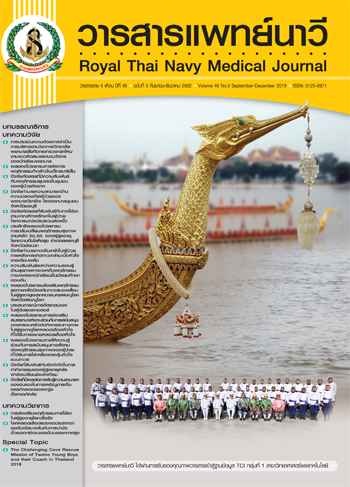Selected Factors Related to Medication Adherence in Patients with Bipolar Disorder
Main Article Content
Abstract
The purpose of this descriptive research was to examine the relationship between selected factors including gender, age, education level, marital status, occupation, substance abuse, insight on own illness, drug attitude, age of onset, hospitalization, severity of disease, and medication side effect with medication adherence in patients with bipolar disorder. The purposive sample of 198 clients with bipolar disorder who met the inclusion criteria were recruited from outpatients department of Ramathibodi Hospital and Vajira Hospital. The research instruments were: 1) the Personal Data Record Form, 2) the Side Effect Rating Scale, 3) the Medication Adherence Behaviors Scale, 4) the Insight Scale Thai version, 5) Drug attitude Inventory (Thai version), and 6) Brief Bipolar Disorder Symptoms Scale (Thai version). The Cronbach’s alpha coefficient reliability of the five latter instruments were 0.81, 0.88, 0.81, 0.81, and 0.86, respectively. Statistic technique utilized in data analysis was frequency, percentage, standard deviation, mean, Spearman’s Rank, and Point Biserial Correlation.
Major findings of this study were as follows:
- Bipolar patients had score on overall medication adherence in the excellent level (= 4.64, SD = 0.46).
- Gender, education level, marital status, occupation, substance abuse, insight on own illness and hospitalization were not significantly related to medication adherence in patients with bipolar disorder at the level of .05.
- Age, age of onset and drug attitude was significantly positive related to medication adherence in patients with bipolar disorder at the level of .05.
- Severity of disease and medication side effect was significantly negative related to medication adherence in patients with bipolar disorder at the level of .05.
Article Details

This work is licensed under a Creative Commons Attribution-NonCommercial-NoDerivatives 4.0 International License.
References
Anderson IM, Haddad PM, Scott J. Bipolar disorder. BMJ 2012 Dec 27;345:e8508. doi: 10.1136/bmj.e8508.
Pompili M, Harnic D, Gonda X, Forte A, Dominici G, Innamorati M, et al. Impact of living with bipolar patients: making sense of caregivers’ burden. World J Psychiatry 2014;4(1):1-12.
Reuangtragul S. Psychiatric textbook. 10th ed. Bangkok: Ruenkaew Printing; 2014. (in Thai).
Merikangas KR, Jin R, He JP, Kessler RC, Lee S, Sampson NA, et al. Prevalence and correlates of bipolar spectrum disorder in the world mental health survey initiative. Arch Gen Psychiatry 2011;68(3):241-51.
Department of Mental Health. Global Assessment of Function (GAF). [Internet]. [cited 12 March 2017]. Available from: https://www.dmh.moph.go.th/gaf.asp.
Ittasakul P. Bipolar disorder. In: Lotrakul M, Sukanit P, editors. Psychiatry Ramathibodi. Bangkok: Beyond Enterprise; 2015. p. 155-6. (in Thai).
Sattayatham C, Chansook P, Charoen S. Psychiatric nursing and mental health 2. 1st ed. Bangkok: Tanapress; 2013. (in Thai).
Vega P, Barbeito S, Azua SRD, Martinez-Cengotitabengoa M, Gonzalez-Ortega L, Saenz M, et al. Bipolar disorder differences between genders: special considerations for women. Womens Health (Lond) 2011;7(6):663-74.
Colom F, Vieta E, Tacchi MJ, Sanchez-Moreno J, Scott J. Identifying and improving non-adherence in bipolar disorders. Bipolar Disord 2005;7(5):24-31.
Farragher B. Treatment compliance in the mental health service. Ir Med J 1999;92(6):392-4.
Chakrabarti S. What’s in a name?: compliance, adherence and concordance in chronic psychiatric disorders. World J Psychiatr 2014;4(2):30-6.
Leclerc E, Mansur RB, Brietzke E. Determinants of adherence to treatment in bipolar disorder: a comprehensive review. J Affect Disord 2013;149(1-3):247-52.
Jonsdottir H, Opjordsmoen S, Birkenaes AB, Simonsen C, Engh JA, Ringen PA, et al. Predictors of medication adherence in patients with schizophrenia and bipolar disorder. Acta Psychiatr Scand 2013;127(1):23-33.
Kanchanarak O. Factors predicting medication adherence behavior of schizophrenic patients in community. [Master’s Thesis, Faculty of Nursing]. Chulalongkorn University; 2002. (in Thai).
Thorndike RM. Correlational procedures for research. New York: Garner Press; 1978.
Birchwood M, Smith J, Drury V, Healy J, Macmillan F, Slade MA. A self-report insight scale for psychosis: reliability, validity and sensitivity to change. Acta Psychiatr Scand 1994;89(1):62-7.
Awad AG. Subjective response to neuroleptics in schizophrenia. Schizophr Bull 1993;19(3):609-18.
Laoprasertsook K. The effect of family-focused treatment program on symptom severity of patients with bipolar disorder patient. [Master’s Thesis, Faculty of Nursing]. Chulalongkorn University; 2011. (in Thai).
Orem DE. Nursing concepts of practice. 2nd ed. New York: McGraw-Hill Book Company; 1985.
Sajatovic M, Micula-Gondek W, Tatsuoka C, Bialko C. The relationship of gender and gender identity to treatment adherence among individuals with bipolar disorder. Gend Med 2011;8(4):261-8.
Kassaoui H, Bouhlel S, Nakhli J, Ben Mahmoud I, Ben Nasr S, Ben Hadj Ali B. Factors influencing drug compliance in bipolar disorder. Tunis Med 2016;94(1):60-5.
Chakrabarti S. Treatment-adherence in bipolar disorder: a patient-centered approach. World J Psychiatry 2016;6(4):399-409.
Chaiyapong P, Aungsuroch Y, Suktrakul S. The effect of life goals therapy program on functioning in patients with bipolar disorders. Royal Thai Navy Medical Journal 2019;46(1):66-82. (in Thai).
Suto M, Murray G, Hale S, Amari E, Michalak EE. What works for people with bipolar disorder? Tips from the experts. J Affect Disord 2010;124(1-2):76-84.
Teter CJ, Falone AE, Bakaian AM, Tu C, Ongür D, Weiss RD. Medication adherence and attitudes in patients with bipolar disorder and current versus past substance use disorder. Psychiatry Res 2011;190(2-3):253-8.
Ray C, Lindop J, Gibson S. The concept of coping. Psychol Med 1982;12(2):385-95.
Gonzalez PA, Reed C, Novick D, Bertsch J, Haro JM. Assessment of medication adherence in cohort of patients with bipolar disorder. Pharmacopsychiatry 2010;43(7):263-70.
Lam D, Hayward P, Watkins E, Wright K, Sham P. Relapse prevention in patients with bipolar disorder: cognitive therapy outcome after 2 years. Am J Psychiatry 2005;162(2):324-9.


